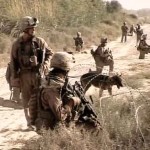Even though the strategy projects Al Qaeda and its associates operating from sanctuaries in Pakistan as posing a threat to the world as a whole, its objective is limited to preventing another 9/11 in US territory mounted from this region. It does not pay equal attention to the concerns of India and other countries.
Bush too hailed Pakistan as a frontline ally in the war against terrorism and provided it with various lollipops — over US$ 10 billion in military and economic aid since 9/11, dual-use weapons and equipment which could be used against the terrorists as well as against India and a willingness to close the eyes to Pakistan’s sins of commission and omission against India so long as it acted against terrorism directed at the US. These lollipops failed to make the regime of Pervez Musharraf co-operate sincerely against Al Qaeda and the Taliban. These incentives could not prevent the Neo Taliban of Afghanistan from staging a spectacular come-back from sanctuaries in Pakistan and Al Qaeda and its associates from organizing acts of terrorism in different parts of the world.
The lessons from the failure of Bush’s strategy were: Firstly, a policy based only on incentives will not work in the case of an insincere state such as Pakistan. Secondly, a policy which makes a distinction between terrorism directed against the US and terrorism directed against India and the rest of the world will be ineffective. Thirdly, the fear of exercising too much pressure on Pakistan lest the State collapse and its nuclear arsenal fall into jihadi hands is exploited by Pakistan to prevent the ultimate success of the war against terrorism.
One was hoping — on the basis of the statements by him during his election campaign — that Obama would have factored these lessons into the formulation of his new strategy. Surprisingly, he has not. The same old policy of incentives and nothing but incentives is sought to be pursued under the garb of a so-called new strategy. The only new feature is the emphasis on the benchmarks of implementation which will determine the continued availability of the incentives to Pakistan at every stage. The only disincentive with which Pakistan has been confronted is the risk of the incentives drying up if it is seen as dragging its feet in its co-operation in the fight against terrorism.
A failed Pakistan may be a disaster for the people of Pakistan, but not necessarily for the rest of the world.
Obama’s strategy — like the one of his predecessor — is marked by a fear of punishing Pakistan if it does not change its policy of using terrorists to advance its own strategic agenda. The reluctance to punish Pakistan if it continues to be insincere in dealing with terrorism originating from its territory arises from the fear that too much pressure on Pakistan and a policy of punitive measures might push Pakistan into the arms of the jihadis or might result in a collapse of the Pakistani State with unpredictable consequences. The US must rid itself of this fear and make it clear to Pakistan that, if the worst comes to the worst, the world is prepared to face the eventuality of a failed Pakistan. A failed Pakistan may be a disaster for the people of Pakistan, but not necessarily for the rest of the world.
It is important to constitute a contact group to work out alternative strategies with incentives as well as disincentives, with rewards as well as punishments. Such a contact group must be only of the victims of terrorism. A contact group, which seeks to bring together the victims of terrorism as well as the perpetrator, will be a non-starter.
Obama’s strategy has three components — a counter-insurgency component for Afghanistan, a counter-terrorism component for use in Pakistan and a counter-radicalization component for use in the entire Af–Pak region. It is a mix of military and political measures. While the military measures will be largely implemented by the US and other NATO powers plus Australia, the regional role of countries such as India, China and Iran is sought to be restricted to the political component. They will have no say in the way the military measures are implemented.
 The US expectations that the international community will co-operate in implementing the unilaterally worked out US strategy can be belied because the strategy offers no end in sight to the wave of terrorism of Pakistani origin faced by them. This is particularly true of India. Even though the strategy projects Al Qaeda and its associates operating from sanctuaries in Pakistan as posing a threat to the world as a whole, its objective is limited to preventing another 9/11 in US territory mounted from this region. It does not pay equal attention to the concerns of India and other countries. The strategy is, therefore, unlikely to excite professionals in India.
The US expectations that the international community will co-operate in implementing the unilaterally worked out US strategy can be belied because the strategy offers no end in sight to the wave of terrorism of Pakistani origin faced by them. This is particularly true of India. Even though the strategy projects Al Qaeda and its associates operating from sanctuaries in Pakistan as posing a threat to the world as a whole, its objective is limited to preventing another 9/11 in US territory mounted from this region. It does not pay equal attention to the concerns of India and other countries. The strategy is, therefore, unlikely to excite professionals in India.




